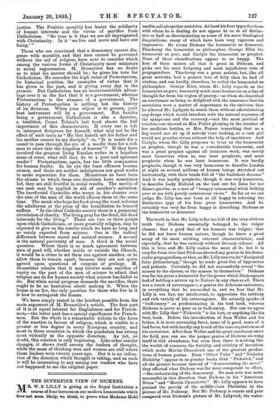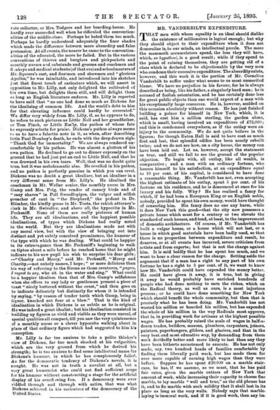THE SUPERFINE VIEW OF DICKENS.
MR. W. S. LILLY is giving at the Royal Institution a course of four lectures on our modern humourists which does not seem likely, we think, to prove what Madame Mohl used to call altogether nutritive. At least his four types for those with whom he is dealing do not appear to us at all distinc- tive or half as discriminating as some of his more theological disquisitions, many of which have been very vigorous and impressive. He terms Dickens the humourist as democrat, Thackeray the humourist as philosopher, George Eliot the humourist as poet, and Carlyle the humourist as prophet. None of these classifications appear to us happy. The first of them misses all that is great in Dickens, and picks out his most fatiguing and most injudicious vein of propagandism. Thackeray was a great satirist, but, like all great satirists, had a greater love of folly than he had of wisdom, and can hardly, therefore, be called the humourist as philosopher. George Eliot, whom Mr. Lilly regards as the humourist as poet, was surely much more humorous on a line of thought far from the region of poetry,—as when she described an auctioneer as being so delighted with the assurance that his secretions were a matter of importance to the universe that he allowed Mr. Lydgate to watch them without administering any drugs which would interfere with the natural sequence of the symptoms and the recovery,—not the most poetical of touches,—or showed us Mrs. Pullet glorying in the number of her medicine bottles, or Mrs. Poyser remarking that as a dog would not sit up if nobody were looking, so' a vain girl would not practise virtue without the help of spectators. And Carlyle, whom Mr. Lilly proposes to treat as the humourist as prophet, though he was a considerable humourist, and was a great prophet against all insincere work, was surely most humorous when he was least prophetic, and most prophetic when he was least humorous. It was hardly prophetic, though it was very humorous to describe London at night as several millions of human beings stretched out horizontally, with their heads full of "the fooliahest dreams." And it was hardly prophetic, though it was very humorous, to describe Lady Holland on the look out for lions for her dinner-parties, as a sort of " hungry ornamental witch looking over at me with purely carnivorous views." So far as we can judge, Mr. Lilly has not been at all happy in selecting the distinctive type of his four great humourists. And he certainly was very far from happy in describing Dickens as the humourist as democrat.
The truth is, that Mr. Lilly is far too full of the very obvious truth that Dickens essentially belonged to the vulgar classes ; that a good deal of his humour was vulgar; that he did not know human nature, though he knew a great many of its most striking external characteristics; and especially, that he was entirely without literary culture. All this is true, and Mr. Lilly makes the most of it; but it is very far from true that Dickens showed any genius in his demo- cratic propagandism, or that, as Mr. Lilly asserts, he "dissipated false philanthropy," though he made great fun of hypocrites and pedants. Certainly, he did not successfully reveal " the masses to the classes, or the masses to themselves." Dickens was far too great a humourist for the power which Shakespeare had of holding a mirror up to Nature in any class at all. There was a touch of extravagance, a genius for delicious caricature, in everything that he succeeded in, and we fear that Mr. Lilly is too fine, too intellectual, to appreciate the subtlety and rich variety of his extravagance. He actually speaks of " buffoonery " as predominating in his best book, whereas Dickens is never so poor as in buffoonery. Nor can we agree' with Mr. Lilly that " Pickwick " is his best, or anything like his best, book. Before the introduction of Sam Weller and his father, it is mere screaming farce, some of it good, some of it bad farce, but with hardly any touch of the true exquisiteness of his caricature. After Sam Weller and the great coachman enter the field, you can see the proper genius of Dickens showing itself in rich abundance, bat even then there is nothing like the wealth of resource, the fertility, and subtlety of invention which make Martin Chuzzlewit one of the greatest produc- tions of human genius. Even " Oliver Twist" and "Nicholas Nickleby " appear to us greater books than " Pickwick," and all the greater because instead of " democratising the novel" they effected what Dickens was far more competent to effect, —the caricaturing of the democracy. No man ever was more successful in that direction than Dickens in his "American Notes" and "Martin Chuzzlewit." Mr. Lilly appears to have praised the parody of the middle-class Philistine in the picture of Mr. Podsnap. But Mr. Podsnap is coarse and poor compared with Dickens's picture of Mr. Lillyvick, the water- rate collector, or Mrs. Todgers and her boarding-house. He hardly ever succeeded well when he ridiculed the convention- alities of the middle•clasi. Perhaps he hated them too much. Perhaps he hardly understood adequately the finer shades which made the difference between mere absurdity and false pretension. At all events, the nearer he came to the convention. alities of the educated, the more he failed. But in the various conventions of thieves and burglars and pickpockets and monthly nurses and cabstands and grooms and coachmen and 11 ,nkeys and medical students (of that era)and schoolmasters of Mr. Squeera's cast, and dustmen and showmen and "glorious Apollos," he was inimitable, and introduced into his sketches Fist that finest touch of caricature which, we will assert in opposition to Mr. Lilly, not only delighted the cultivated of his own time, but delights them still, and will delight them as long as English literature endures. Mr. Lilly is reported to have said that "no one had done so much as Dickens for the idealising of common life. And the world's debt to him for that elevating influence could hardly be overrated." We differ very widely from Mr. Lilly, if, as he appears to do, he refers to such pictures as Little Nell and her grandfather, or Tom Pinch, or Little Em'ly, the pathos of whose fate he expressly selects for praise. Dickens's pathos always seems to us to have a falsetto note in it, as when, after describing little Paul Dombey's death, he ends with the deep-drawn sigh, " Thank God for immortality." We are always rendered un- comfortable by his pathos. He was almost a glutton of his own pathos. He declined to go out to dinner expressly on the ground that he had just put an end to Little Nell, and that he was drowned in his own tears. Well, that was no doubt quite true, but it, was melodramatic also. He revelled in his pathos, and no pathos is perfectly genuine in which you can revel. Dickens was no doubt a great idealiser, but an idealiser in a very different sense from Mr. Lilly's. He idealised the coachman in Mr. Weller senior, the monthly nurse in Mrs. Gamp and Mrs. Prig, the vendor of canary birds and of "easy shaves" in Poll Sweedlepipes, the vulgar and selfish preacher of cant in " the Shepherd," the pedant in Dr. Blimber, the kindly goose in Mr. Toots, the rakish attorney's- clerk in Mr. Swiveller, and above all, the hypocrite in Mr. Pecksniff. None of them are really pictures of human life. They are all idealisations, and the happiest possible idealisations, of types which Dickens had really noted is the world. But they are idealisations made not with any moral view, but with the view of bringing out into distinct and yet subtly conceived prominence, the humour of the type with which he was dealing. What could be happier in its extravagance than Mr. Pecksniff's beginning to walk on tiptoe about a mile before he reached home that he might indicate to his new pupil his wish to surprise his dear girls ; —" Charity and Mercy," said Mr. Pecksniff, " Mercy and Charity,—not unholy names, I hope ; " or more delicious than his way of referring to the Sirens as those creatures, "pagan, I regret to say, who sit in the water and sing." What could be a happier idealism than that of Mrs. Gamp's selfishness when she offers to any lady or gentleman present a piece of toast " nicely buttered without the crust," and then goes on to indicate delicately but distinctly for whom it is intended by saying, " by reason of tender teeth which Gamp, being in liquor, knocked out four at a blow." That is the kind of idealisation in which Dickens is as subtle as he is original. He was indeed a great idealist ; but his idealisation consisted in building up figures as vivid and visible as they were unreal, of special qualities all compact, till you saw the very quintessence of a monthly nurse or a clever hypocrite walking about in place of that ordinary figure which had suggested to him his conception.
Mr. Lilly is far too anxious to take a polite thinker's view of Dickens, far too much shocked at his vulgarities, which are the very ground from which he derived his strength; he is too anxious to find some intellectual name for Dickens's humour, in which he has conspicuously failed. As for the democratic tendency of Dickens's novels, it is nought. He was not in truth a novelist at all, but a very great humourist who could not find sufficient scope for his humour without constructing a stage for the artificial display of his overtbwing fun. If a democracy were ever riddled through and through with satire, that was what Dickens achieved iu his caricature of the democracy of the United States.



















































 Previous page
Previous page